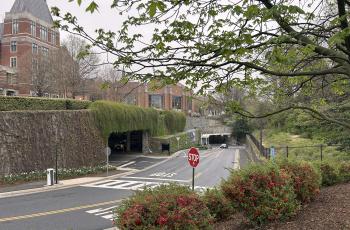| What does it mean? |
DC Water allows residents, businesses, and government agencies to discharge stormwater, groundwater, and surface water runoff from construction/dewatering projects or other temporary water discharges (e.g., power wash runoff, hydro-demolition wastewater, etc.) to the District's wastewater system on a case-by-case basis. However, uncontaminated non-wastewater flows (e.g., stormwater, groundwater, surface water runoff, etc.) may only be discharged to the combined sewer system, storm sewer, or to an outfall that discharges to a natural stream/river. It is illegal to discharge uncontaminated non-wastewater flows, including groundwater to the separate sanitary sewer system. The District's local limit discharge standards apply to all temporary dischargers. DC Water currently has no numerical standards for volatile organics, however, specific prohibitions may apply that prohibit the discharge if it contains volatile organics in amounts that may create a fire or explosion either alone or by interaction with other substances or result in the presence of toxic, noxious, or malodorous liquids, solids, gases, vapors, or fumes within the District's wastewater system which alone or in interaction with other wastes, are capable of creating a public nuisance or hazard to humans or animals, are sufficient to cause acute worker health and safety problems, or are sufficient to cause interference or pass-through. In order to determine if volatile organics require pretreatment and to determine if a non-wastewater flow is considered contaminated, DC Water compares water quality data to published literature values in EPA's Guidance to Protect POTW Workers from Toxic and Reactive Gases and Vapors and EPA's Local Limits Development Guidance. |
|---|---|
| What does "uncontaminated" mean |
Uncontaminated means the discharge (prior to treatment) does not exceed the District's pretreatment standards: local limit discharge standards or prohibited discharge standards |
| Does this apply to me? |
Applicants wanting to discharge non-wastewater flows (e.g., stormwater, groundwater or surface runoff) or other temporary discharges to the District's wastewater system must submit a Temporary Discharge Authorization (TDA) Permit Application to the Pretreatment Program Manager. If the volume of the discharge is greater than 25,000 gallons per day (gpd) and the duration of the discharge is greater than six months, the applicant may be requested to submit an Industrial User Wastewater Discharge Permit application. If the groundwater is not contaminated and the discharge location is near a separate storm sewer system (i.e., not part of the combined sewer system), then the applicant may be required to contact the DC Department of Energy & Environment to direct the discharge to the storm sewer. To determine if the project is in a separate storm sewer area contact DC Water's Permit Operations at 202-646-8600. If the groundwater is to be discharged to the combined sewer system, then DC Water will determine the conditions under which a TDA Permit will be issued and whether metering and fees are required. |
| When do I apply? | Once you are aware that you have stormwater, groundwater, or surface water runoff, or other water that must be discharged on a temporary basis, you should commence the process to determine whether you need a permit. |
| What do I need to submit? |
|
| Where do I go and apply? |
The application package shall be mailed or delivered to the DC Water Telephone: 202-787-4177 For expeditious processing, a copy of the application package may also be emailed to pretreatment@dcwater.com with a hard copy to follow in the mail. |
| How long will it take? | Approximately 2 weeks |
| What do I Receive? |
A Temporary Discharge Authorization (TDA) Permit is issued and the permit is valid for up to two years. A permit may be extended by written request if within the two year permit term. A new permit application must be submitted prior to the expiration date if the discharge has not been completed within the two year permit term. |
| What are DC Water's fees for this? |
There is no cost for the permit. However, if DC Water determines that the discharge must be metered, the permittee will be charged a fee for the metered discharge amount. Please see the DC Water Rates and Metering page for additional information. |
| Related Activities: |
If the site is in a separate storm sewer area and the discharge contains uncontaminated groundwater or surface water, the applicant must contact the DC Department of Environment Water Quality Division at 202-535-2600 to inquire about discharging to the storm sewer. |
| Additional Info | Once a permit is obtained, the permittee must submit signed and certified periodic self-monitoring reports to the Pretreatment Program Manager as required under site-specific conditions in the TDA permit. Unscheduled random inspections of project sites may also be conducted. |
| Regulatory Info | Section 1509 of the Pretreatment regulations - District of Columbia Municipal Regulations Chapter 15 of Title 21 titled "Discharges to Wastewater System". |
Temporary Discharge Authorization Permit


